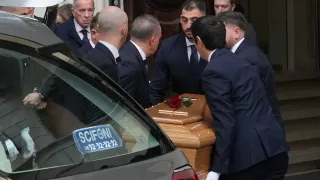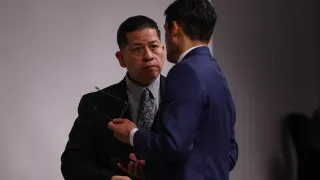November 6, 2024
Acclaimed Opera Bass Morris Robinson Is Back at Boston Lyric Opera in 'Aida,' Where It All Began
Nicholas Dussault READ TIME: 9 MIN.
EDGE: I think it's safe to assume it went well.
Morris Robinson: The Boston music community is extremely elite, which I didn't know walking into it. It's very small and well connected. I sang the national anthem for Janice Giampa, who ran the continuing education program, and Tim Steele. They asked me if I'd ever sung opera and I said "no," and they put me in their Opera Studio. I had no idea what we were doing, but there was an opening for someone to play the Devil in an opera in Salem, MA on Halloween weekend. It was there that Sharon Daniels and Steve Steiner from Boston Lutheran Opera heard me sing. They said they could really change my life if I was serious about it because my voice was something they need in their business. I was invited to audition for Boston Opera Institute at Boston University. I hired Donald Wilkinson, a teacher they recommended, who taught me four arias of contrasting styles. I auditioned and I got in. And that was the moment the decision was made to quit my job and study this opera thing and see where it takes me.
EDGE: That's a huge leap.
Morris Robinson: I lost lots of sleep over it. Denise was always saying "just go for it." I had a house, a mortgage, a company car, an expense account. Things were going pretty well at the age of 29 in corporate America. But I begrudgingly came to the conclusion that if they were going to offer me a full scholarship to do this, I'm going to take two years out of my life and just try it, see what happens. At the end of two years, I'm going to get a job. I'll be fine. I'll be 32. But I have never looked back.
EDGE: What a great story you have.
Morris Robinson: It sounds really nice and concise when you put it on a note card, I went from absolutely ground zero to going to Boston University where they gave me my first assignment as Bluebeard in "Bluebeard's Castle" in English. Then I auditioned for the Boston Lyric Opera who said they wanted me to be the King in "Aida." That's huge. It happened so fast, but I think the beauty of it is before I realized the enormity of what was happening, I was already in it. So you either freak out or do it. I think that's really where being a high caliber collegiate NCAA athlete was a perfect precursor for what I did. Mentally, I was strong enough to do it. I knew how to do it on my feet. Having gone to a military academy, I was able to take orders, to be focused. I knew how to black out everything and have tunnel vision. I was going to make sure I do everything they tell me to do to bring this to fruition so I won't have any regrets. And now, this is my 25th year singing professionally. I'm currently in Houston Grand Opera singing Fernando in "Il Travatore." So, yeah, a lot has happened since then.
EDGE: And here you are 25 years later, back at the BLO doing "Aida," where you will be feted as an artistic honoree at the gala that follows the performance.
Morris Robinson: It's very flattering and it's always nice to be recognized at home. I consider Boston my musical home, because it's where I started. I'm honored to be recognized by the company that gave me my first break. And like I said, other than God, I don't think anyone could have written the story where on the 25th anniversary to the day of my professional debut as an opera singer, I get to go back to the place where I did the same exact opera in a bigger role, and then be honored as one of their artistic ambassadors. I'm very excited about it. I'm filled with emotion, really sometimes just trying to figure out how the heck dis all this happen? Is this truly my life? It's almost like a fairy tale.
At this point all I can do is just continue to enjoy the journey, enjoy the ride, continue to put my best foot forward, make sure that I make good on the people that invested in me at this company. I will enjoy this moment, but I will also put tunnel vision back on, because, you know, there's always a shiny new model coming up behind you. I want to make sure I'm always kicking butt, so no one even thinks about me NOT doing this.
EDGE: One more question. Are you still a football fan?
Morris Robinson: Absolutely, I don't miss any. I watch my whole Saturday if I'm not on stage, and even when I'm on stage I'm just watching college football all day. I've tried to go to all my Citadel football games since my son's on the team. But if I'm not there I watch it on my iPad or on my phone. I keep up with college football more than pro because I think the kids pretty much still play with a lot of passion and not for the paycheck.
The Boston Lyric Opera presents a concert version of "Aida," Sunday, November 10, 2024 at the Emerson Colonial Theatre, 106 Bolyston Street, Boston, MA. For more information, follow this link.






